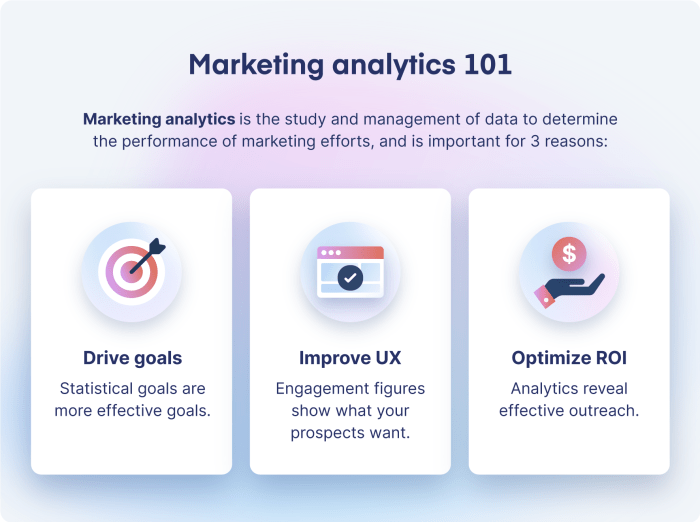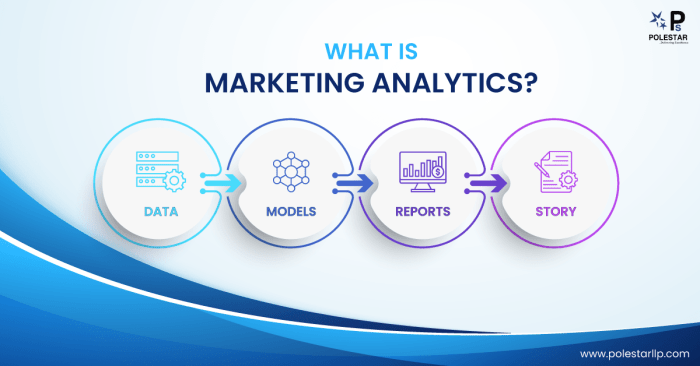Using Analytics in Marketing opens the door to a world of possibilities, where data-driven decisions pave the way for successful marketing campaigns. Dive into the realm of analytics and discover how it can revolutionize your marketing strategies.
From understanding the importance of analytics to implementing the right tools and measuring performance, this topic delves deep into the realm of marketing data analysis.
Understanding Analytics in Marketing

Analytics in marketing refers to the process of collecting, analyzing, and interpreting data to make informed decisions that drive marketing strategies. It involves tracking various metrics and key performance indicators (KPIs) to understand customer behavior, campaign effectiveness, and overall marketing performance.
Importance of Analytics in Marketing
Analytics plays a crucial role in shaping marketing strategies by providing valuable insights into customer preferences, trends, and behaviors. By leveraging data analytics, marketers can optimize campaigns, target the right audience, personalize messaging, and measure ROI effectively.
- Identifying target audience segments based on demographics, behavior, and preferences.
- Measuring the success of marketing campaigns through metrics like conversion rates, click-through rates, and engagement levels.
- Optimizing marketing strategies in real-time by analyzing data and making data-driven decisions.
- Personalizing customer experiences through targeted messaging and content based on analytics insights.
Data-driven decisions in marketing analytics allow marketers to allocate resources effectively, improve campaign performance, and ultimately drive business growth.
Examples of Analytics in Marketing Campaigns
Analytics can be used in various ways to enhance marketing campaigns and achieve better results. For instance, analyzing website traffic data can help optimize landing pages for higher conversions, while tracking social media engagement metrics can guide content creation strategies.
- Using A/B testing to compare different ad creatives and determine which resonates better with the target audience.
- Utilizing predictive analytics to forecast customer behavior and tailor marketing efforts accordingly.
- Implementing marketing automation tools to streamline processes and analyze campaign performance more efficiently.
Types of Analytics Used in Marketing

In the field of marketing, various types of analytics are utilized to gather insights and make informed decisions to drive business growth and optimize marketing strategies.
Descriptive Analytics, Using Analytics in Marketing
Descriptive analytics focuses on summarizing past data to understand what has happened in the marketing campaigns. It involves collecting and organizing historical data to provide a clear picture of the current state of affairs. For example, tracking website traffic, social media engagement, and sales figures are common applications of descriptive analytics in marketing.
Predictive Analytics
Predictive analytics uses statistical algorithms and machine learning techniques to forecast future trends and outcomes based on historical data. In marketing, predictive analytics can be used to anticipate customer behavior, identify potential leads, and forecast sales trends. For instance, businesses can predict customer churn rates or forecast demand for a new product using predictive analytics.
Prescriptive Analytics
Prescriptive analytics goes beyond predicting future outcomes by suggesting the best course of action to achieve a desired result. It combines insights from descriptive and predictive analytics to provide recommendations for decision-making. In marketing, prescriptive analytics can help businesses optimize their marketing mix, allocate resources effectively, and personalize customer experiences. For example, prescriptive analytics can recommend the most effective marketing channels to reach target audiences based on past performance data.By leveraging descriptive, predictive, and prescriptive analytics in marketing strategies, businesses can gain a comprehensive understanding of their audience, make data-driven decisions, and maximize the impact of their marketing efforts.
Each type of analytics brings unique benefits and insights that, when combined, can lead to more effective and efficient marketing campaigns.
Implementing Analytics Tools in Marketing: Using Analytics In Marketing
Implementing analytics tools in marketing is crucial for businesses to make informed decisions and optimize their strategies. By utilizing the right tools effectively, companies can better understand their target audience, track the performance of their campaigns, and ultimately drive more successful outcomes.
Popular Analytics Tools Used in Marketing
- Google Analytics: A widely used tool for tracking website traffic, user behavior, and conversions.
- Adobe Analytics: Provides advanced analytics and real-time data to optimize marketing efforts.
- HubSpot: Offers a comprehensive suite of marketing analytics tools for inbound marketing strategies.
- SEMrush: Focuses on and competitive analysis to improve digital marketing performance.
Selecting the Right Analytics Tools for Marketing Needs
When choosing analytics tools for marketing, businesses should consider factors such as their specific goals, budget, data integration capabilities, and ease of use. Conducting thorough research, seeking recommendations, and testing out trial versions can help in making an informed decision.
Best Practices for Implementing Analytics Tools in Marketing Strategies
- Set clear objectives and KPIs to measure the effectiveness of analytics tools.
- Ensure proper training for team members to maximize the use of analytics tools.
- Regularly monitor and analyze data to make timely adjustments to marketing strategies.
- Integrate analytics tools with other marketing platforms for a holistic view of performance.
Challenges in Integrating Analytics Tools into Marketing Processes
- Complexity in data interpretation and analysis can be a challenge for businesses without dedicated analytics expertise.
- Data privacy and security concerns may arise when handling sensitive customer information through analytics tools.
- Integration issues with existing systems and platforms can hinder the seamless implementation of analytics tools in marketing processes.
Measuring Marketing Performance with Analytics
In the world of marketing, measuring performance is crucial to understand the effectiveness of campaigns and strategies. Analytics plays a key role in providing insights and data-driven decisions to optimize marketing efforts.
Key Performance Indicators (KPIs) in Marketing Analytics
- Conversion Rate: Measures the percentage of website visitors who take a desired action, such as making a purchase or signing up for a newsletter.
- Return on Investment (ROI): Calculates the profitability of marketing campaigns by comparing the revenue generated to the cost of the campaign.
- Customer Lifetime Value (CLV): Predicts the total revenue a business can expect from a customer throughout their entire relationship.
Tracking and Measuring Marketing Success
- Website Traffic: Monitoring the number of visitors, page views, and bounce rates to gauge the effectiveness of marketing efforts.
- Social Media Engagement: Analyzing likes, shares, comments, and click-through rates to measure audience interaction and brand awareness.
- Email Marketing Metrics: Tracking open rates, click-through rates, and conversion rates to assess the performance of email campaigns.
Continuous Monitoring and Analysis
Continuous monitoring of marketing performance through analytics is essential for making data-driven decisions and optimizing strategies in real-time. By regularly analyzing KPIs and metrics, businesses can identify areas for improvement and capitalize on successful tactics for better results.